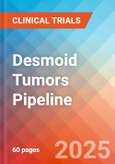Desmoid Tumors: Understanding
Desmoid Tumors: Overview
Desmoid tumors, also known as desmoid-type fibromatosis, are rare, non-metastatic soft tissue tumors that arise from the connective tissues, specifically the fibroblasts, in the body. These tumors are characterized by their aggressive local growth and potential to invade surrounding tissues, though they do not spread to distant organs. They most commonly develop in the abdominal wall, limbs, and trunk, but can occur anywhere in the body. Desmoid tumors are associated with mutations in the APC gene or the CTNNB1 gene, which lead to abnormal regulation of cell growth and proliferation.The clinical presentation of desmoid tumors varies significantly depending on their location and size. Symptoms often include a noticeable mass or swelling, pain, and sometimes functional impairment of the affected area. Due to their infiltrative nature, these tumors can be challenging to treat, often requiring a combination of surgery, radiation therapy, and pharmacological approaches such as nonsteroidal anti-inflammatory drugs (NSAIDs), hormone therapy, or chemotherapy. Despite treatment, recurrence rates are high, necessitating close and long-term follow-up for affected individuals.
The management of desmoid tumors is complex and tailored to the individual, taking into account factors such as tumor size, location, growth rate, and the patient's overall health. In some cases, a watchful waiting approach is adopted, particularly for asymptomatic tumors, given the potential for spontaneous regression and the significant morbidity associated with aggressive treatments. Advances in understanding the molecular biology of desmoid tumors are driving the development of targeted therapies, offering hope for more effective and less invasive treatment options in the future.
'Desmoid Tumors- Pipeline Insight, 2025' report outlays comprehensive insights of present scenario and growth prospects across the indication. A detailed picture of the Desmoid Tumors pipeline landscape is provided which includes the disease overview and Desmoid Tumors treatment guidelines. The assessment part of the report embraces, in depth Desmoid Tumors commercial assessment and clinical assessment of the pipeline products under development. In the report, detailed description of the drug is given which includes mechanism of action of the drug, clinical studies, NDA approvals (if any), and product development activities comprising the technology, Desmoid Tumors collaborations, licensing, mergers and acquisition, funding, designations and other product related details.
Report Highlights
The companies and academics are working to assess challenges and seek opportunities that could influence Desmoid Tumors R&D. The therapies under development are focused on novel approaches to treat/improve Desmoid Tumors.Desmoid Tumors Emerging Drugs Chapters
This segment of the Desmoid Tumors report encloses its detailed analysis of various drugs in different stages of clinical development, including phase III, II, I, preclinical and Discovery. It also helps to understand clinical trial details, expressive pharmacological action, agreements and collaborations, and the latest news and press releases.Desmoid Tumors Emerging Drugs
AL102: Immunome
AL102 is an investigational small molecule gamma secretase inhibitor currently being evaluated for the treatment of desmoid tumors - a debilitating soft tissue malignancy. AL102 is a potential once-daily oral treatment for desmoid tumors. Currently, the drug is in Phase III stage of its clinical trial for the treatment of Desmoid Tumors.Desmoid Tumors: Therapeutic Assessment
This segment of the report provides insights about the different Desmoid Tumors drugs segregated based on following parameters that define the scope of the report, such as:Major Players in Desmoid Tumors
- There are approx. 4+ key companies which are developing the therapies for Desmoid Tumors. The companies which have their Desmoid Tumors drug candidates in the most advanced stage, i.e. Phase III include, Immunome.
Phases
The report covers around 4+ products under different phases of clinical development like
- Late stage products (Phase III)
- Mid-stage products (Phase II)
- Early-stage product (Phase I) along with the details of
- Pre-clinical and Discovery stage candidates
- Discontinued & Inactive candidates
Route of Administration
Desmoid Tumors pipeline report provides the therapeutic assessment of the pipeline drugs by the Route of Administration. Products have been categorized under various ROAs such as- Oral
- Intravenous
- Subcutaneous
- Parenteral
- Topical
Molecule Type
Products have been categorized under various Molecule types such as
- Recombinant fusion proteins
- Small molecule
- Monoclonal antibody
- Peptide
- Polymer
- Gene therapy
Product Type
Drugs have been categorized under various product types like Mono, Combination and Mono/Combination.Desmoid Tumors: Pipeline Development Activities
The report provides insights into different therapeutic candidates in phase III, II, I, preclinical and discovery stage. It also analyses Desmoid Tumors therapeutic drugs key players involved in developing key drugs.Pipeline Development Activities
The report covers the detailed information of collaborations, acquisition and merger, licensing along with a thorough therapeutic assessment of emerging Desmoid Tumors drugs.Desmoid Tumors Report Insights
- Desmoid Tumors Pipeline Analysis
- Therapeutic Assessment
- Unmet Needs
- Impact of Drugs
Desmoid Tumors Report Assessment
- Pipeline Product Profiles
- Therapeutic Assessment
- Pipeline Assessment
- Inactive drugs assessment
- Unmet Needs
Key Questions
Current Treatment Scenario and Emerging Therapies:
- How many companies are developing Desmoid Tumors drugs?
- How many Desmoid Tumors drugs are developed by each company?
- How many emerging drugs are in mid-stage, and late-stage of development for the treatment of Desmoid Tumors?
- What are the key collaborations (Industry-Industry, Industry-Academia), Mergers and acquisitions, licensing activities related to the Desmoid Tumors therapeutics?
- What are the recent trends, drug types and novel technologies developed to overcome the limitation of existing therapies?
- What are the clinical studies going on for Desmoid Tumors and their status?
- What are the key designations that have been granted to the emerging drugs?
Key Players
- Immunome
- Iterion Therapeutics
Key Products
- AL102
- Tegavivint
This product will be delivered within 2 business days.
Table of Contents
Companies Mentioned (Partial List)
A selection of companies mentioned in this report includes, but is not limited to:
- Immunome
- Iterion Therapeutics








